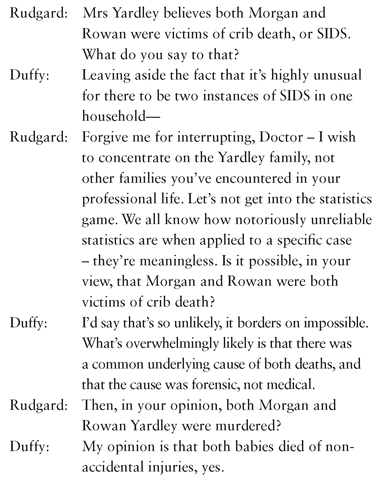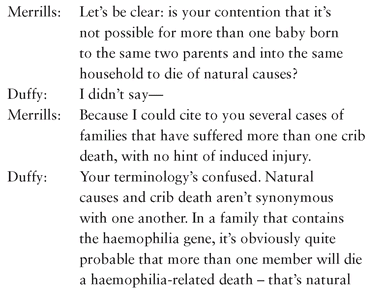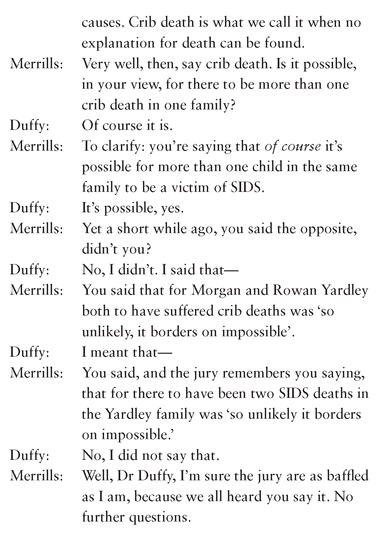The Cradle in the Grave (36 page)
Read The Cradle in the Grave Online
Authors: Sophie Hannah

In the first draft, Lorna Keast and Joanne Bew were part of that list. So why aren't they now?
From
Nothing But Love
by Helen Yardley with Gainer Mundy
5 November 1996Nothing But Love
by Helen Yardley with Gainer Mundy
I didn't enjoy any of the days of my trial, but the worst was 5 November. That was when I came face to face with Dr Judith Duffy for the first time, when she gave her evidence in chief, which means in response to prosecuting counsel's questions. Unbelievably, I had never met or seen her before, even though she claimed to know so much about me and my family. But I knew what sort of person she was. Ned and Gillian had warned me. She's the sort of woman who is happy to say that a grief-stricken mother committed two murders without even bothering to speak to her or get to know her first. In contrast, Dr Russell Meredew, one of the many heroes of this story and the main expert witness for the defence, had spent days with Paul and me, interviewed us both at length, and painstakingly compiled what he called his âdossier'. We joked that by the time he'd finished it was as thick as an encyclopaedia! Incidentally, Dr Meredew tried to present the dossier to Justice Wilson in court, and Wilson's shocking response was, âYou don't expect me to read all that, do you?'
I watched Dr Duffy closely as she took the stand and felt real, heart-shaking terror for the first time since the trial had begun. There was something about her that chilled me. Until that moment, I had assumed I would be going home with Paul at the end of this ridiculous charade. We would get Paige back and live happily ever after. I had no doubts about this because I was innocent. I knew it, Paul knew it, and the jury would know it too. Ned had assured me that once Russell Meredew had explained to them, in his gentle but authoritative way, that it was entirely possible both Morgan and Rowan died of natural causes, there was no way in the world I would be convicted of murder.
But when Judith Duffy's eyes met mine for the first time, I felt as if I'd been punched in the stomach. I saw no compassion whatsoever. Her bearing was haughty and arrogant. She looked exactly like the sort of person who would try to send me to prison for the rest of my life simply because she could, to prove that she was right. I didn't know at the time, but I found out later that Paul had felt exactly the same way about her, and so had Ned and Gillian.
I honestly felt as if I was being tortured as I sat there, helpless, listening to her describe what I must have done to my precious Morgan and Rowan in order to cause the injuries she claimed they'd sustained. I heard her tell the jury, many of whom were in tears, that I had poisoned my children using salt, that I had smothered them repeatedly, with the aim of taking them to the hospital and getting lots of attention for myself. I'd never heard anything so ridiculous in my life. If I'd wanted attention, I thought, I'd have walked down the street in a Minnie Mouse costume, done the cancan naked in my front garden â something funny and harmless. I would
never, never
have murdered my babies.
never, never
have murdered my babies.
When I heard Dr Duffy say that Rowan's skull had been fractured, I wanted to scream, âYou're lying! I never hurt my babies! I adored them, I had nothing but love for them!'
I will never forget the way Dr Duffy's examinationin-chief ended. It's painfully etched on my mind for ever. When I checked the trial transcript, it corresponded almost word for word with what I remembered:


I dissolved in tears as Judith Duffy calmly told these lies about me, but, although I was distraught, neither Paul nor I had any idea how much damage had been done by her use of the phrase âso unlikely, it borders on impossible'. Ned, however, with all his years of trial expertise, knew exactly how dangerous it was for the jury to hear those words. It didn't matter that a few seconds earlier, they'd heard the great Ivor Rudgard QC say that statistics can't be relied upon in cases like mine â that wasn't the part that would stick in their minds. It wasn't as memorable or impressive as Dr Duffy's magic formula for finding guilt where there is none: âso unlikely, it borders on impossible'.
When Reuben Merrills rose to cross-examine Dr Duffy, Ned flashed one of his brilliant ray-of-hope smiles at me:
Don't worry, Merrills is the best defence barrister in the land â he'll demolish her
. He certainly did his best:


Don't worry, Merrills is the best defence barrister in the land â he'll demolish her
. He certainly did his best:


My heart was pounding like the hooves of an excited horse as I listened to this. Thank goodness, I thought. Now the jury will understand what a monstrous liar Judith Duffy is. How could anyone take her opinion seriously now that Reuben Merrills had caught her out in such a blatant lie? But my spirits clouded over when I looked at Paul and Ned and saw that they were both frowning. I found out later that they were seriously worried about the effect of repetition on the jury. Even though Merrills had made short work of proving that Duffy was a flat-out liar, he had twice repeated her original assertion that for Morgan and Rowan both to have died of SIDS was so unlikely it bordered on impossible. Ned told me later that repeating something over and over again is a highly effective way of getting people to believe it. âThe context of the repetition matters less than the repetition itself,' he said. He's right. I was being naïve. Time after time during my trial, the jury heard that phrase: âso unlikely, it borders on impossible.' I didn't know it on 5 November, but I was going to spend nine years of my life in prison as a result of those six words uttered by Dr Duffy, a woman who had never heard me say so much as a single word.
24 October 2004On 24 October, a journalist from the
Daily Telegraph
came to interview me in prison. Paul joked that I could barely fit in his visits now that I was a celebrity. That's what the prison staff called me too: âour resident celebrity'. Everybody at Geddham Hall was wonderfully supportive. They all knew I was innocent, which was a welcome change from Durham, where I was hated and attacked. I knew I had Laurie to thank for people's change of attitude. He'd mounted such a wonderful campaign on my behalf, and even my lovely cautious Ned had been heard to mutter that my appeal next February might just succeed. Laurie had been doing wonders out there in the outside world, and JIPAC was going from strength to strength.
Daily Telegraph
came to interview me in prison. Paul joked that I could barely fit in his visits now that I was a celebrity. That's what the prison staff called me too: âour resident celebrity'. Everybody at Geddham Hall was wonderfully supportive. They all knew I was innocent, which was a welcome change from Durham, where I was hated and attacked. I knew I had Laurie to thank for people's change of attitude. He'd mounted such a wonderful campaign on my behalf, and even my lovely cautious Ned had been heard to mutter that my appeal next February might just succeed. Laurie had been doing wonders out there in the outside world, and JIPAC was going from strength to strength.
I felt so frustrated, because there was only so much I could do from inside, but Laurie was heroically reassuring, and kept telling me that everyone knew JIPAC was my baby as much as his. I couldn't wait to get out and do more to help women in terrible situations like mine, women the justice system had betrayed and abandoned. There were so many of them and I felt so much love and pity for all of them. I'd heard that Rachel Hines was coming to Geddham soon. Her case was almost identical to mine: an innocent mother wrongly convicted of killing her two children. She'd recently been denied leave to appeal, and my heart broke for her.
One thing I could do in prison was write, and I found I loved it. At first I agreed to keep a diary only because Laurie asked me to, but once I started, I couldn't have managed without it. I told the journalist from the
Telegraph
that one day I hoped to publish a book about my life and everything I'd been through. She nodded, as if this was a perfectly natural thing to want, and only to be expected. I wasn't sure she understood how much it meant to me. She must have had to write all the time for her job, but I hadn't written anything since leaving school. She seemed nice, so I let her have a look at my work in progress. âI bet my writing style's terrible, isn't it?' I joked.
Telegraph
that one day I hoped to publish a book about my life and everything I'd been through. She nodded, as if this was a perfectly natural thing to want, and only to be expected. I wasn't sure she understood how much it meant to me. She must have had to write all the time for her job, but I hadn't written anything since leaving school. She seemed nice, so I let her have a look at my work in progress. âI bet my writing style's terrible, isn't it?' I joked.
âThis poem's brilliant,' she said. âReally, really good.' I had to laugh. She might as well have said, âYes, Helen, your writing style is terrible.' The poem, the only part of what I'd written that she'd praised, was the only thing in the notebook that wasn't by me! It was a poem I found in an anthology in Geddham's library, and I thought it was beautiful, so I wrote it down at the front of my notebook, to inspire me. It's by a woman called Fiona Sampson, and it's called âAnchorage':
Those fasting women in their cells
drained a honeycomb brain
of every sugar drop of sense;
they made the skull a silvered shell
where love could live, cuckoo-like â
drained a honeycomb brain
of every sugar drop of sense;
they made the skull a silvered shell
where love could live, cuckoo-like â
Â
Would any question what she did
to distance her from how we live,
outside such dedication? â Shedding
the various world, so as to fit
in ways a jealous lover likes?
to distance her from how we live,
outside such dedication? â Shedding
the various world, so as to fit
in ways a jealous lover likes?
Â
What flutters still is a bird: blown in
by accident, or wild design
of grace, a taste of something sweet â
The emptied self a room swept white.
by accident, or wild design
of grace, a taste of something sweet â
The emptied self a room swept white.
I wasn't entirely sure what the poem meant, but I knew that from the moment I first read it, it meant the world to me and became one of my treasured possessions. I almost felt as if it must have been written with me in mind! It was about women in cells, which I was â for the time being at least. I particularly loved the last verse because it seemed to me to be so full of hope. I thought that was what the writer was trying to say: that even when you're locked up and everything's been taken away from you, you still have hope. Hope is the bird that still flutters, âblown in by accident, or wild design of grace, a taste of something sweet'. And because you've lost everything, in your empty life that is now âa room swept white', a hope that might otherwise be so tiny and fragile suddenly seems huge and sweet and powerful, because it's the only thing there.
Every night in my cell, I lay in my bed crying for my lost babies and imagining those wings of hope fluttering and flapping in the darkness beside me.
14
10/10/09
âMy being struck off is a foregone conclusion,' said Judith Duffy. âIt will happen even if I defend myself, and since I won't . . .'
âNothing? Not even someone to speak on your behalf?' Charlie made sure to sound curious rather than disapproving. She'd only been talking to Duffy for ten minutes or so, but already it had made her aware of how judgemental she normally was, often entertaining herself while others were speaking by gleefully mocking their clothes, mannerisms, stupidity â all in the privacy of her own mind, of course, and so probably harmless, except she was finding now that she had shamefully little experience of listening to another person in what must (she assumed) be the ideal way â without the secret hope that within seconds her bitchy streak would have something to get its teeth into.
Talking of clothes, Judith Duffy's were a little odd. Individually, each garment was okay, but the ensemble didn't work: a lacy white blouse, a shapeless purple cardy, a grey kneelength skirt that might have been half of a suit, black tights, and flat black shoes with large bows on them that looked as if they would suit a younger woman better. Charlie couldn't work out if Duffy had tried to dress smartly or casually this morning; either way, she hadn't got the look quite right.
Charlie had talked her way into Duffy's house by appealing to what they had in common. It had taken more honesty than she'd thought it would, and she'd ended up almost convincing herself that she and this plain, prim-looking doctor were some kind of outcast soulmates, to the point that to condemn Duffy now for anything would feel like condemning herself, and Charlie was bored of doing that. She'd given it up roughly a year ago.
Other books
Special Ops Exclusive by Elle Kennedy
Kamikaze Lust by Lauren Sanders
Dawn Endeavor 4: Gunnar's Game by Marie Harte
The Way We Were by Sinéad Moriarty
Mergers and Acquisitions For Dummies by Bill Snow
Ashes of Heaven by Terry C. Johnston
The Divine Path (The Divine Series) by Johnston, Allen J
T. Lynn Ocean - Jersey Barnes 01 - Southern Fatality by T. Lynn Ocean
The Bar Code Rebellion by Suzanne Weyn
Breaking the Silence (Hard Drive Book 2) by Tricia Andersen
